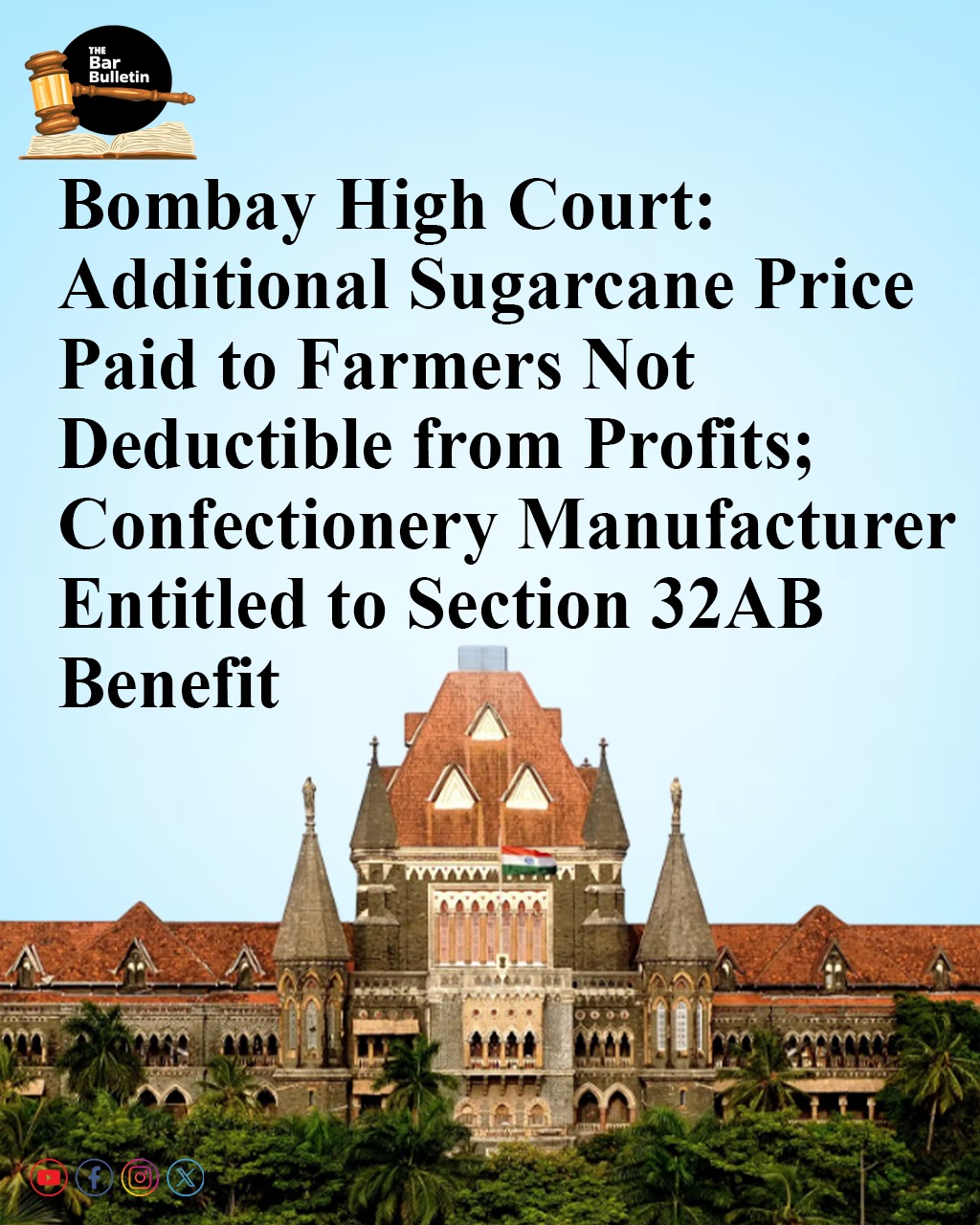While clarifying that there cannot be two different incomes, one for the Companies Act and another for the Income Tax Act, for the application of Section 32AB, the Bombay High Court has ruled that the profits for the grant of benefit under Section 32AB of the Income Tax Act can only be the one that is determined as per Parts II and III of Schedule-VI of the Companies Act, rather any further determination as per the Income Tax Act. The Court held that while computing the benefit u/s 32AB, the profit of the eligible business computed as per Parts II and III of Schedule-VI to the Companies Act can alone be taken into consideration, and therefore, the additional sugarcane price could not have been deducted as expenditure while considering the profits, for the grant of benefit u/s 32AB.
Reference was made to the beneficial provision of Section 32AB, which acts as an incentive to the taxpayer carrying on business or profession by allowing a deduction of 20% of the profits from the business, subject to the condition that the amount needs to be either deposited with the development bank or utilized for the purchase of new Plant & Machinery.
The Division Bench comprising Chief Justice Alok Aradhe and Justice Sandeep V. Marne observed that though the amount of additional sugarcane price is not deducted from the amounts of profits for the previous A.Y., the same has been deducted from the amount of profits for the following year. The Bench also observed that a similar practice was followed for all the A.Y.s where the appellant had paid additional sugarcane price, which though was claimed of Rs.30,56,352/- which, though, was claimed as an expenditure in the previous year, but was deducted from the amount of profits in the subsequent year, therefore, resulting in no revenue loss for the department.
In this case, the appellant, a confectionery and candy manufacturer, used to purchase sugarcane from farmers for manufacturing toffees & sugar candy. Since various Co-operative Sugar Factories in the State of Maharashtra had determined the final price of sugarcane to be paid to the farmers after the end of the sugarcane season by considering the cost of production, the appellant framed a policy of paying them a certain additional amount over the final price, as an incentive. This additional sugarcane price of Rs. 30.56 lacs was added back to the net profit of Rs. 41.11 lacs and claimed as an expenditure. However, while computing deduction u/s 32AB, the said additional sugarcane price was not added to the net profit, as the net profit was determined as per the Profit and Loss account prepared as per Parts II and III of Schedule VI of the Companies Act. The appellant’s accounts were also audited u/s 44AB, after which it filed the return declaring total income at Rs. 32.72 lakhs, and claimed deduction u/s 32AB at Rs. 9.75 lacs. This practice of the appellant did not go well with the AO, who allowed deduction u/s 32AB only to the tune of Rs. 1.66 lacs, after reducing the additional sugarcane price paid from the net profit computed as per the Companies Act. This decision of the AO was affirmed by the CIT(A) as well as the ITAT.
When the matter reached the High Court, it was noted that a unique conundrum was created on account of the fixation of a statutory minimum price by the Controller of Sugarcane after closure of accounts of the appellant, as the appellant has been continuing with the practice of claiming deduction of additional sugarcane price for income tax purposes in one year but taking into consideration the figure of profit without such deduction for calculating the 20% benefit u/s 32AB and thereafter subtracting the said amount of additional sugarcane price in the subsequent year’s profit.
The Court noted that whatever has been done by the appellant, the same was backed by the enabling provision in Section 32AB, which permits consideration of profits reflected in the accounts finalized under Parts II and III of the VI Schedule of the Companies Act for computing the benefit u/s 32AB. At the same time, the Court also noted that only for the A.Y. 1990-91, the AO selectively did not agree to the appellant’s action in not adjusting the additional cane price against the profits for the said A.Y., and such practice of the appellant was not objected to by the AO for previous A.Ys.
Finding that, though it may appear to the AO while assessing accounts of a particular year that the appellant is taking advantage by showing expenses of additional sugarcane price paid to farmers, but hiding the same while computing profits for a 20% benefit of deduction u/s 32AB, however since the appellant deducted the very same amount from profits of the subsequent year, the Court concluded that the 20% additional benefit received u/s 32AB in one year gets neutralized in the subsequent year. Consequently, the Court allowed the appeal in favour of the taxpayer and set aside the orders passed by the AO, the CIT(A), and the ITAT to the said extent.
Cases Relied On:
Commissioner of Income-tax vs Tirupattur Cooperative Sugar Mills Ltd – [2009] 310 ITR 360 (Madras)
Commissioner of Income-tax vs Tamil Nadu Mercantile Bank Ltd – [2016] 68 Taxman 111 (Karnataka)
Deputy Commissioner of Income-tax vs United Nilgiris Tea Estate Co. Ltd – [2005] 273 ITR 470 (Madras)
Commissioner of Income-tax vs Macmillan India Ltd – [2007] 295 ITR 67 (Madras)
South India Sugars Limited vs Deputy Commissioner of Income-tax – [2008] 214 CTR 205 (Madras)
Carborandum Universal Ltd. vs Commissioner of Income-tax – [2004] 265 ITR 372 (Madras)
Cases Distinguished:
Commissioner of Income-tax, Bombay vs Tasgaon Taluka S.S.K. Ltd – [2019] 262 Taxman 176 (SC)
Parry Agro Industries Ltd. vs Commissioner of Income-tax, Cochin – [2006] 156 Taxman 184 (Kerala)
Appearances:
Advocates S. Sriram, B. V. Jhaveri, and Dinesh Kukreja, for the Appellant / Taxpayer
Advocate Samiksha R. Kanani, for the Respondent / Department

